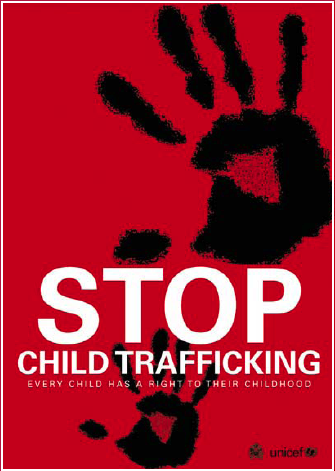Eye of the Child: Making Malawi a Safer Place for Children
Did you know that January 11th has been designated by a 2007 US Senate Resolution as National Human Trafficking Awareness Day for the countless victims of human trafficking across the globe? In observance of this important day and critical global issue, we'd like to bring you a story about the inspiring work that Firelight grantee, Eye of the Child, has been doing to make Malawi a safer place for children:
 Local Action and Legal Reform Used to Combat Child Labor, Sexual Abuse, Human Trafficking, and Child Marriage
Local Action and Legal Reform Used to Combat Child Labor, Sexual Abuse, Human Trafficking, and Child Marriage
Soon after her parents died, Naphiri, then age 11, agreed to leave her rural village to work as a maid for a city family.
She hoped to “say bye to the miserable days” spent begging and scavenging, and looked forward to sending money to support her four siblings.
But instead, Naphiri traded one miserable life for another. She found herself a virtual prisoner, toiling long days with few breaks, closely supervised, threatened with beatings, and often going without pay.
Naphiri’s story is not uncommon in Malawi where most people live on one dollar a day and the AIDS pandemic has created a generation of orphans.
The United Nations reports that Malawi has the highest level of child labor in the region and estimates that one in three Malawian children are vulnerable to human trafficking or labor exploitation.
Impoverished children work in dangerous and abusive settings—not just in private homes, but on tea and tobacco plantations and in small businesses. Most insidious, traffickers use fictitious job offers to lure children and kidnap them into forced labor and prostitution.
Naphiri was rescued after several years, thanks to a campaign by Eye of the Child (EYC), supported by the Firelight Foundation. In total, nearly 300 children like Naphiri were returned to their families and re-enrolled in school.
Since 1995, EYC has worked to protect Malawian children’s rights by battling not only child labor, but child abuse, human trafficking, and harmful traditional practices such as arranged, forced, and early marriage.
The organization works on a variety of levels combining traditional human rights advocacy with social services for victims—training communities and students on child rights; undertaking legal casework on behalf of exploited children; working directly to rehabilitate abused children; and lobbying for legal reform and enforcement.
“Give Children Their Childhood”
“Our message is every child has a right to go to school,” says Maxwell Matewere, EYC’s executive director. “Give children their childhood, respect their rights, protect their health.”
With support from Firelight Foundation, EYC turned those words into action in 2007 in Lunzu, a trading hub on the outskirts of Malawi’s commercial center of Blantyre. The area—known for bars, brothels, and beer making—is where Naphiri was working.
EYC galvanized area communities with 26 public rallies on the dangers of child labor and trained 32 community-based organization (CBO) staff members as child protection workers. They also tapped community watch committees they had previously established to monitor local children.
Working with the newly trained child protection workers and community watch committees, almost 300 children were identified and removed from hazardous, exploitative work settings.
In all, 123 young children, including Naphiri, were re-enrolled in primary school, and another 164 older children began vocational training in carpentry, tailoring, and sheet metal work.
Despite poverty and the impact of HIV/AIDS, “families are focusing on alternatives for income other than child labor,” says Matewere.
The campaign is having a lasting impact. One year later, 90 percent of the children removed from child labor remain in school and one-third of the youths in vocational training had already found jobs in their new trades.
A steep decline in child labor cases reported to authorities suggests that the campaign prevented 2,000 other children from leaving school for work, says Matewere.
“These accomplishments are remarkable, and made more so because they are sustainable,” says Aili Langseth, Firelight Foundation’s Malawi program officer. “Eye of the Child has created protection mechanisms that remain poised to respond whenever child labor practices occur in the future.”
Mobilizing for Legal Reform and Enforcement
In 2006 and again in 2009, Matewere and Eye of the Child were in the international media spotlight when the organization publicly questioned aspects of pop singer Madonna’s adoptions of Malawian orphans.
“Madonna might have good intentions, but we must follow the law to the letter to avoid a situation where criminals with money might take advantage to abuse our children,” he told the BBC.
EYC is working to ensure that Malawi’s contradictory laws governing adoption and child protection are reformed and strengthened to protect the nation’s orphans and vulnerable children.
Matewere now serves as a government-appointed member of a national commission developing anti-human trafficking legislation.
“Arresting perpetrators is only part of the solution,” he argues. “The Malawi constitution guarantees crime suspects with certain basic rights; we must not forget the rights of victims.”
“Our laws must ensure that abused and exploited children receive care, rehabilitation, and protection from further victimization by the people who violated their rights.”
Planning ahead, EYC spearheaded a group of regional organizations that in 2008 began to take steps to prevent children from being trafficked into South Africa for prostitution during the summer 2010 World Cup soccer competition, an event expected to draw a huge influx of foreign tourists.
“Our greatest fear is that many Malawian children could end up in South African brothels. We are working to prevent the World Cup from creating a security loophole for perpetrators,” says Matewere.
With new support from the Firelight Foundation, EYC has begun a campaign to keep girls from dropping out of school in the Lunzu area. They are also advocating for new laws limiting marriage by minors to prevent parents from “selling their daughters for dowry payments.”
These activities reflect one of EYC’s key strengths—the organization is effective at working on both local and national level issues simultaneously, notes Langseth.
“EYC recognizes that in order to make the protection of child rights widespread in Malawi, they need to help smaller CBOs build their capacity to provide ongoing, direct services for local children,” she says. “To support children’s rights on an international and local level, we need visionaries and advocates like Matewere.”

